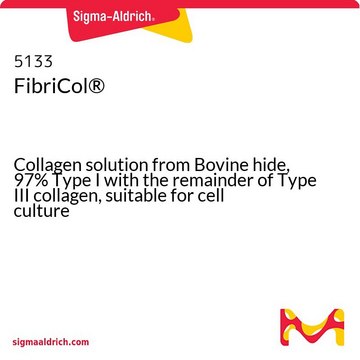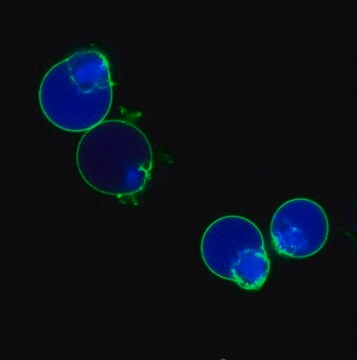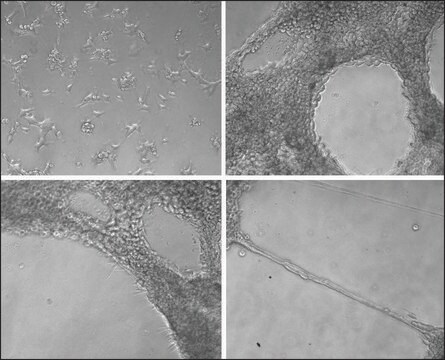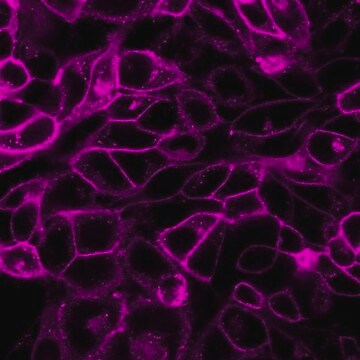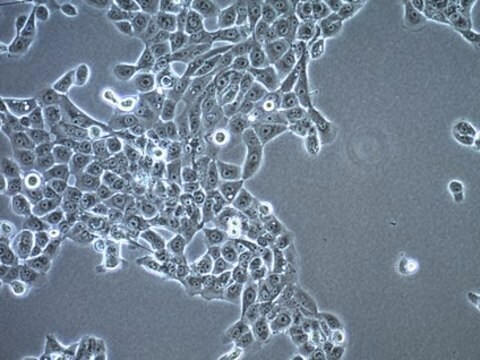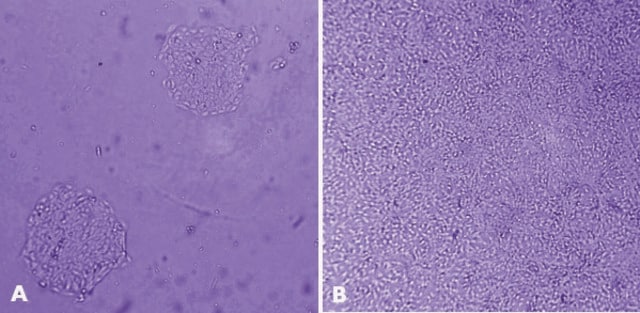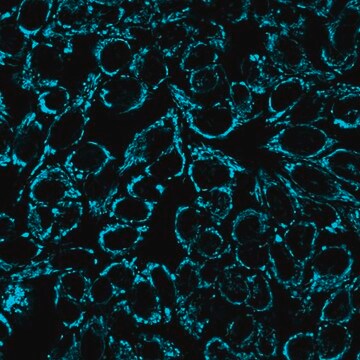SCM144
BrightCell MEMO Photostable Media
Live cell imaging cell culture media (DMEM), 500ml
Sign Into View Organizational & Contract Pricing
All Photos(1)
About This Item
UNSPSC Code:
12352207
eCl@ss:
32160801
Recommended Products
form
liquid
technique(s)
cell culture | stem cell: suitable
shipped in
ambient
General description
BrightCell MEMO photostable media is used as a replacement for DMEM prior to and during exposure to light during live cell imaging. MEMO supplemented with SOS during exposure to prolonged periods of blue light results in significantly higher levels of cell viability.
Protocol
Some of the phototoxic components present in standard media (but removed from MEMO/NEUMO) contribute to cellular proliferation. Consequently, MEMO/NEUMO should only be used during the phase of the experiment in which cells are exposed to prolonged periods of light. SOS, in contrast, supports cellular viability and proliferation equal to alternative (phototoxic) supplements and should be used continuously during cell maintenance.
SOS should be used to replace neuronal supplements, such as B-27, if you are currently using these in your media. If you are presently using FBS, this can be harmful to cells under intensive light. Replacement of FBS with SOS may help to support the growth of cells, especially when used in conjunction with cell line specific growth factors.
Media Preparation
1. Thaw SOS at 37°C. SOS is supplied as a 25X concentrate and should be added to MEMO/NEUMO to a final concentration of 4%. Any liquid remaining should be aliquoted into working volumes and store at -20°C.
Note: Avoid freeze-thawing of SOS supplement more than twice.
2. Add additional components in an aseptic manner according to Table 1 in the userguide.
3. Once supplemented, the complete media is stable for 2 weeks when stored at 4°C.
Cell Culture
1. Initially expand/maintain cells in the dark using Neurobasal supplemented with SOS.
2. The evening before exposure to prolonged periods of light, replace Neurobasal/SOS with pre-warmed MEMO/NEUMO and SOS. Cells will maintain viability for up to 3 days if required.
a.Aliquot media to pre-heat, repetitive heating and cooling of bottles of media may cause precipitation.
3. Perform experiment requiring exposure to light.
4. Once exposure to light has been completed, remove the MEMO/NEUMO and SOS and replace with Neurobasal/SOS.
BrightCell is a trademark of Merck KGaA, Darmstadt, Germany.
MEMO, NEUMO and SOS are registered trademarks of Cell Guidance Systems LLC.
Neurobasal and B-27 are registered trademarks of Life Technologies.
Protocol
Some of the phototoxic components present in standard media (but removed from MEMO/NEUMO) contribute to cellular proliferation. Consequently, MEMO/NEUMO should only be used during the phase of the experiment in which cells are exposed to prolonged periods of light. SOS, in contrast, supports cellular viability and proliferation equal to alternative (phototoxic) supplements and should be used continuously during cell maintenance.
SOS should be used to replace neuronal supplements, such as B-27, if you are currently using these in your media. If you are presently using FBS, this can be harmful to cells under intensive light. Replacement of FBS with SOS may help to support the growth of cells, especially when used in conjunction with cell line specific growth factors.
Media Preparation
1. Thaw SOS at 37°C. SOS is supplied as a 25X concentrate and should be added to MEMO/NEUMO to a final concentration of 4%. Any liquid remaining should be aliquoted into working volumes and store at -20°C.
Note: Avoid freeze-thawing of SOS supplement more than twice.
2. Add additional components in an aseptic manner according to Table 1 in the userguide.
3. Once supplemented, the complete media is stable for 2 weeks when stored at 4°C.
Cell Culture
1. Initially expand/maintain cells in the dark using Neurobasal supplemented with SOS.
2. The evening before exposure to prolonged periods of light, replace Neurobasal/SOS with pre-warmed MEMO/NEUMO and SOS. Cells will maintain viability for up to 3 days if required.
a.Aliquot media to pre-heat, repetitive heating and cooling of bottles of media may cause precipitation.
3. Perform experiment requiring exposure to light.
4. Once exposure to light has been completed, remove the MEMO/NEUMO and SOS and replace with Neurobasal/SOS.
BrightCell is a trademark of Merck KGaA, Darmstadt, Germany.
MEMO, NEUMO and SOS are registered trademarks of Cell Guidance Systems LLC.
Neurobasal and B-27 are registered trademarks of Life Technologies.
Experiments with live cultured cells, including fluorescence microscopy, optogenetics, and fluorescence activated cell sorting (FACS) often entail high levels or prolonged exposure to blue light. However, cell culture media and supplements contain components that are converted to toxic free radicals by light. In particular, DMEM (Dulbecco’s Modified Eagle Medium) and Neurobasal medium, as well as cell culture supplements such as B-27, SATO and NS21, can lead to significant perturbation of cellular behavior and marked increases in cell death. This phenomenon was recently highlight in the following nature publication:
Surpassing light-induced cell damage in vitro with novel cell culture media. Nature Scientific Reports (Learn More!)
The BrightCell photostable media system is cell culture media and supplements that have been reformulated with specific phototoxic components eliminated or replaced. The products allow prolonged exposure of cells to blue light while maintaining high levels of cell viability and functionality. Furthermore, BrightCell media products have very low levels of auto-fluorescence and photo-bleaching, dramatically improving the quality of data that can be obtained using fluorescent live cell imaging.
Surpassing light-induced cell damage in vitro with novel cell culture media. Nature Scientific Reports (Learn More!)
The BrightCell photostable media system is cell culture media and supplements that have been reformulated with specific phototoxic components eliminated or replaced. The products allow prolonged exposure of cells to blue light while maintaining high levels of cell viability and functionality. Furthermore, BrightCell media products have very low levels of auto-fluorescence and photo-bleaching, dramatically improving the quality of data that can be obtained using fluorescent live cell imaging.
Application
Live cell imaging cell culture media (DMEM), 500ml
Research Category
Cell Culture
Cell Culture
Components
1) One bottle containing 500ml of MEMO Photostable Media (SCM144-1). Store at 2-8°C.
2) One bottle containing 5ml of Supplement A (SCM149). Store at -20°C.
2) One bottle containing 5ml of Supplement A (SCM149). Store at -20°C.
Quality
pH: 7.0-7.6
Osmolality: 320-360 mOsm/kg H2O
Sterility: Negative
Functional Test: Pass
Osmolality: 320-360 mOsm/kg H2O
Sterility: Negative
Functional Test: Pass
Storage and Stability
MEMO/NEUMO media should be stored at 2 to 8°C for up to 1 year. SOS supplement and Supplement A should be stored at -20°C for up to 1 year from manufacture. Avoid freeze-thaw cycles.
Disclaimer
Unless otherwise stated in our catalog or other company documentation accompanying the product(s), our products are intended for research use only and are not to be used for any other purpose, which includes but is not limited to, unauthorized commercial uses, in vitro diagnostic uses, ex vivo or in vivo therapeutic uses or any type of consumption or application to humans or animals.
Signal Word
Warning
Hazard Statements
Precautionary Statements
Hazard Classifications
Skin Sens. 1
Storage Class Code
12 - Non Combustible Liquids
Flash Point(F)
Not applicable
Flash Point(C)
Not applicable
Certificates of Analysis (COA)
Search for Certificates of Analysis (COA) by entering the products Lot/Batch Number. Lot and Batch Numbers can be found on a product’s label following the words ‘Lot’ or ‘Batch’.
Already Own This Product?
Find documentation for the products that you have recently purchased in the Document Library.
Articles
Live cell imaging media and neuronal supplements for fluorescence microscopy using GFP, optogenetics and FACS analysis.
Our team of scientists has experience in all areas of research including Life Science, Material Science, Chemical Synthesis, Chromatography, Analytical and many others.
Contact Technical Service